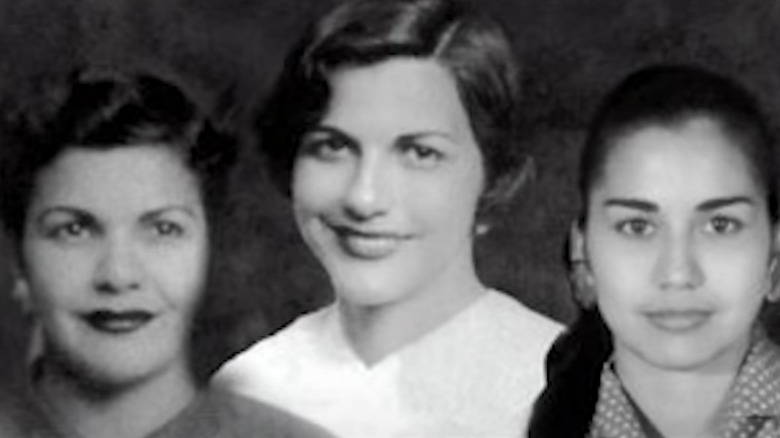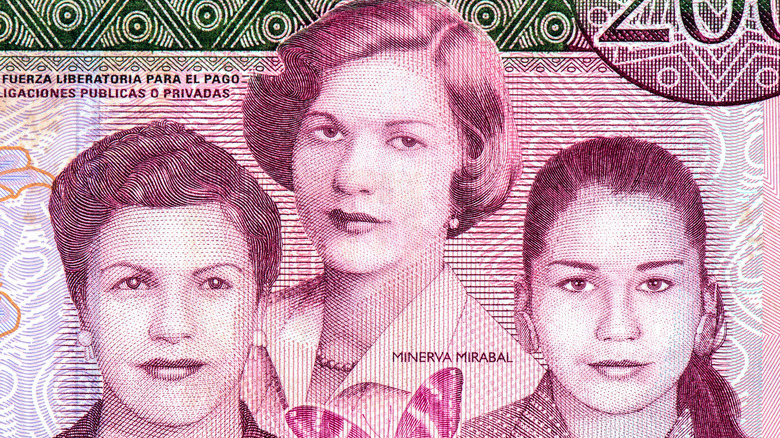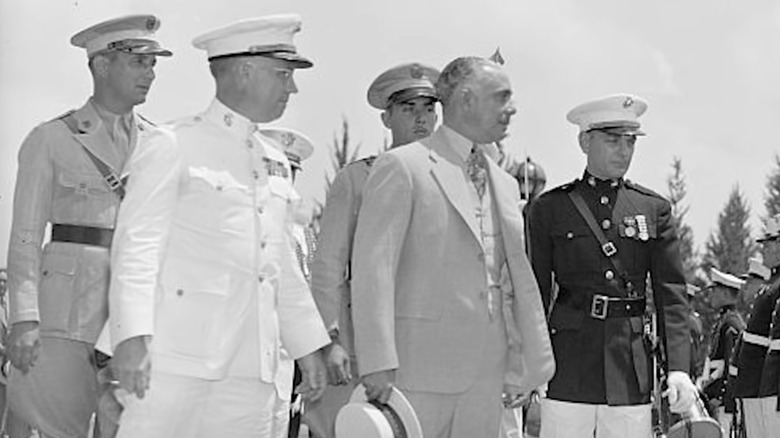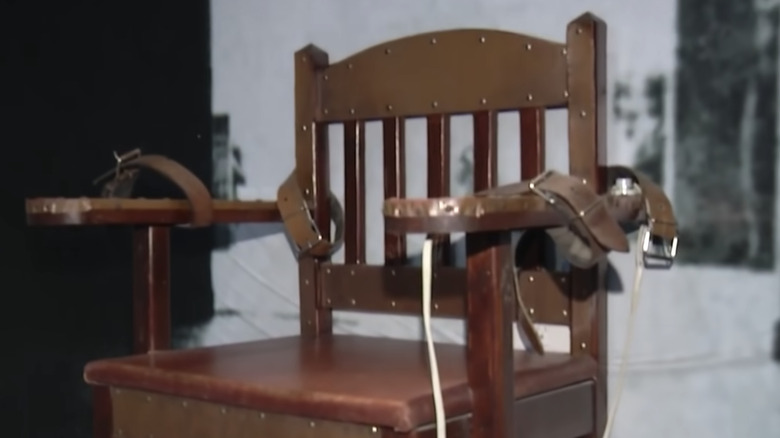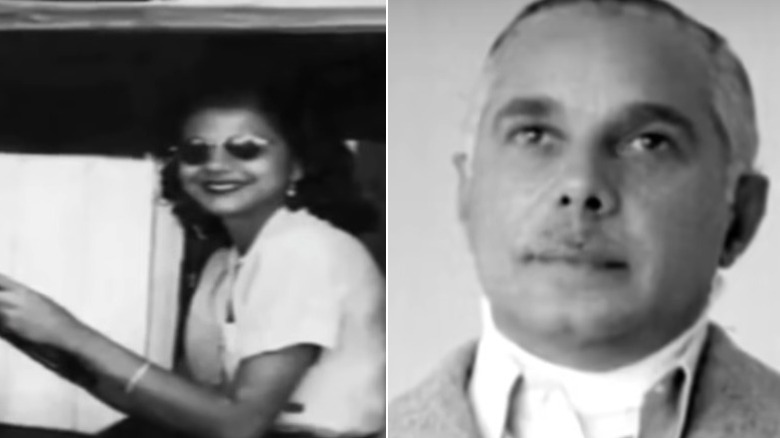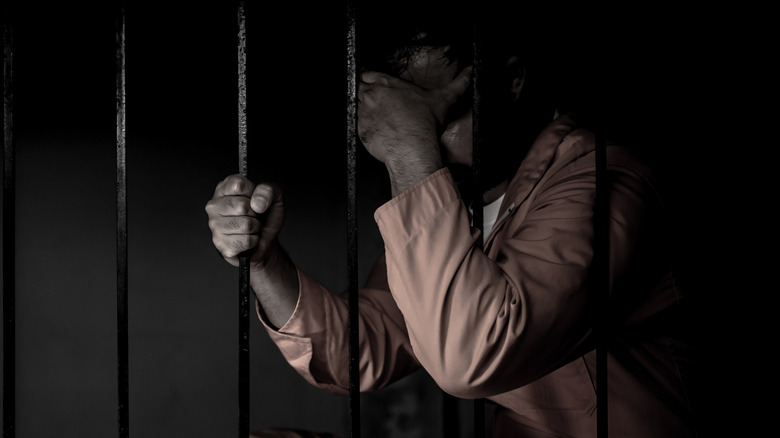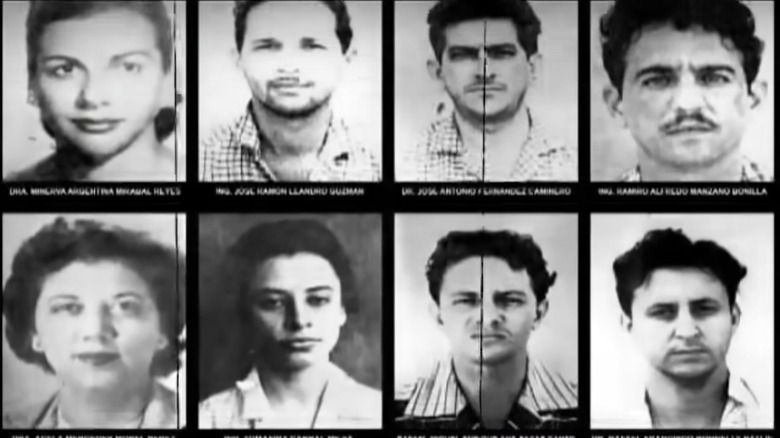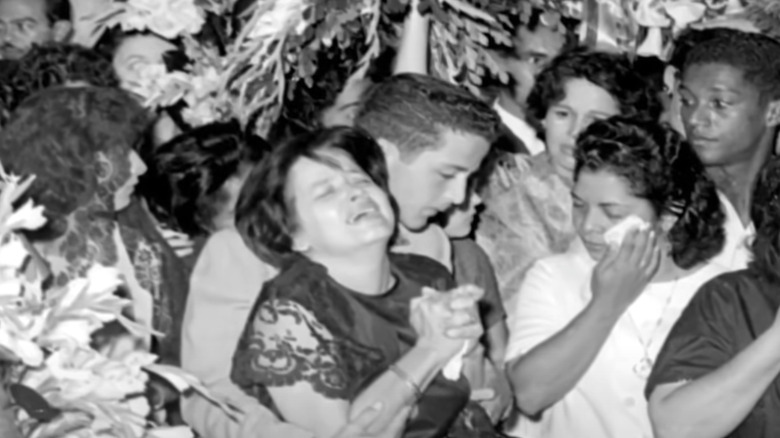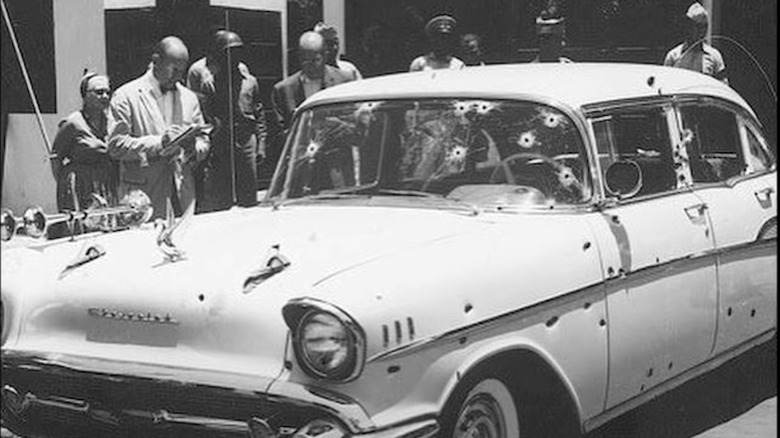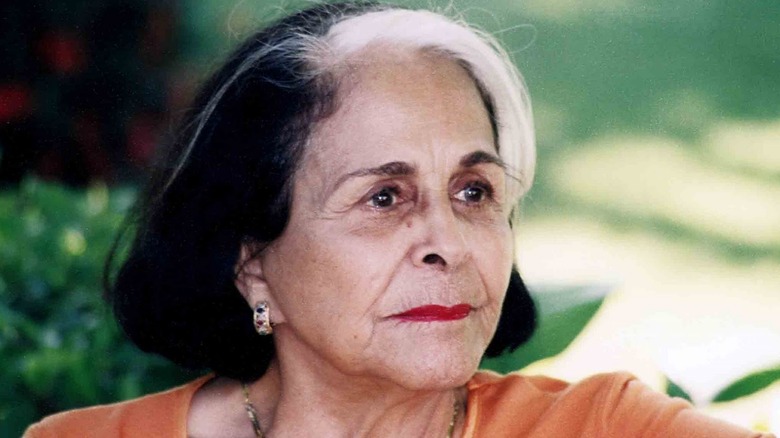The Tragic Assassination Of The Mirabal Sisters Explained
Sometimes the most extraordinary acts of bravery come from the most humble of circumstances. When the three Mirabal sisters stood up against one of the bloodiest tyrants the Americas had ever seen, their only mission was to make the world a better place for their children. They wanted their fellow citizens of the Dominican Republic to taste freedom from a dictator bleeding the country of its resources and murdering its citizens to maintain control.
Known as "Las Mariposas, or "The Butterflies," as per History, these women played an instrumental role in unseating Rafael Trujillo from his position as supreme leader. They orchestrated an underground resistance with the goal of assassinating Trujillo. These women endured constant harassment and multiple prison sentences before they met a violent end at the hands of Trujillo's henchmen. Today they are hailed as feminist heroes with numerous books, films, and landmarks that commemorate their sacrifice, the most well known being the 1994 novel, "In the Time of the Butterflies," by Julia Alvarez.
Who were the Mirabal sisters?
There were four Mirabal sisters — Patria, Dedé, Minerva, and María Teresa — who were born and raised in the quiet town of Ojo de Agua, Dominican Republic. At first glance, they did not seem like the type to be involved in a revolution. History reports they came from a middle-class family that ran a successful farm, a store, and a coffee mill. All of them were married and had children, and all of them were educated at a Catholic boarding school.
According to Vintage News, Minerva Mirabal eventually studied law at the Autonomous University of Santo Domingo. Unfortunately, the dictator and leader of the country, Rafael Trujillo, would not allow her to receive her license to practice due to a personal grievance. The youngest sister, María Teresa Mirabal, attended the same university, but focused on engineering (via Casas Museo Hermanas Mirabal).
With the exception of Dedé Mirabal, all of the sisters spread political dissent alongside their husbands. They were major players in the underground resistance to Trujillo's dictatorship, who had been in power for nearly 30 years before the movement. Their deaths were seen as the straw that broke the camel's back and led to Trujillo's removal from power (via History).
Life in the Dominican Republic under a dictatorship
From 1930 to 1961, the Dominican Republic was in the hands of Rafael Leónidas Trujillo Molina, who ruled the country under a dictatorship (via Biography). Prior to this, beginning in 1916, the United States occupied the country in an effort to prevent Germany from taking control and launching attacks during World War I, as per the U.S. Department of State. The U.S. military withdrew in 1924, when a new democratic government could be established.
According to "Dominican Republic: A Country Study," from the Library of Congress, during the U.S. occupation, Trujillo was gaining power and rising through the ranks of the National Police. He seized power through a coup and a rigged election in 1930.
The world the Mirabal Sisters grew up in saw Trujillo's government bring prosperity and modernize the country. The economy improved, leading to better education, an expanding middle class, and public works. However, he did so by exploiting farmers and lower classes to enrich himself and his loyalists. Trujillo created monopolies by buying out farms, manufacturing, and production, all controlled by himself and his closest allies.
This stability existed under an iron grip, with Trujillo using his secret police force to abduct and murder all who opposed him both domestically and abroad. He developed a personality cult with statues of himself across the country and his portrait in every home, Biographics reports.
The cruelty of Trujillo's regime
The average Dominican citizen lived in a constant state of fear. Rafael Trujillo's regime was ripe with rape, torture, and extrajudicial killing of citizens. According to Biographics, the people were beholden to propping up the dictator's ego –- those that did not suffered dire consequences.
Prisoners were subjected to abuse by the secret police. Time Magazine reports the police would broadcast the screams of prisoners over the P.A. as they were slowly electrocuted. Survivors report that police would use nail extractors, leather whips, and small rubber hammers, among other disturbing methods of torture.
Trujillo also orchestrated the mass murder of thousands of Haitians living in the country near the Haitian-Dominican border. "The Parsley Massacre" took place on October 2, 1937 — the Dominican military armed with machetes slaughtered men, women, and children (via NPR). Over the course of several days, Haitian and Dominican men, women, and children were slaughtered, leaving a body count somewhere between 1,000 to 30,000 people.
He would target young women as well. Laura Derby reports in "The Dictator's Seduction" that Trujillo was known to have young women he found attractive abducted so he could sleep with them. It was such a common occurrence that families would hide their daughters out of fear they might catch his eye because refusal was not an option. Denying the leader would result in the father losing his job, or worse -– something Minerva Mirabal discovered firsthand.
The animosity between Rafael Trujillo and Minerva Mirabal
Minerva Mirabal was the first of the Mirabal sisters to become a dissident against Rafael Trujillo. According to Casas Museo Hermanas Mirabal, from an early age, Minerva harbored resentment for Trujillo. Her maternal uncle planted the first seeds of opposition in her mind. Later, when she went to boarding school she further questioned Trujillo's leadership after befriending a girl whose father had been assassinated on Trujillo's orders.
One day, when Minerva was 22, the Mirabals were forced to attend one of Trujillo's parties, much to the ire of their father, Don Enrique Mirabal. They could not refuse his request, so the sisters went and did their best to avoid Trujillo — but Minerva still became his target.
She danced with Trujillo and rejected his sexual advances — some say she slapped him, as per the illustrated book, "Rejected Princesses." Whatever transpired, the family promptly left the party. This is the moment Trujillo began his vendetta against Minerva. He proceeded to make her life and her family's lives hell.
Minerva and her father were arrested for the party incident. She was released but under constant watch by Trujillo's spies, notes Casas Museo Hermanas Mirabal. When she graduated top of her class in law school, Trujillo denied her license to practice. The family's finances were also ruined under his direction, details Rejected Princesses. According to a BBC interview with Minerva's oldest daughter, they were constantly being watched by Trujillo's agents.
The Mirabal Family's imprisonment
Members of the Mirabal family had been arrested on more than one occasion. In addition to her father being arrested, Minerva Mirabal and her mother were taken into police custody after the party. The Real DR reports they were held hostage at Hotel Nacional, where police ferried Minerva back and forth to interrogations offsite until eventually she and her mother were released.
Later, sometime in the 1950s, Minerva and her parents were arrested yet again. This time police held them in the Hotel Presidente, and her father was detained at Fortress Ozama. The charge was frivolous, as authorities claimed Minerva did not buy a book about Rafael Trujillo. When they were released weeks later, her father died as a result of ill health from being harassed and imprisoned.
Even after getting married and starting a family, Minerva continued to be incarcerated. According to her daughter, Minou Tavarez Mirabal, Minerva and her husband, also an activist, were frequently jailed simultaneously. They would often send letters back and forth between their prison cells, as per BBC.
Following the formation of their "Movement of the Fourteenth of June" group, the Vintage News reports sisters Minerva Mirabal and Maria Teresa Mirabal, along with their husbands, were rounded up one by one and sent to La Victoria Penitentiary in the capital. By this point, Trujillo had lost face with the international community. Under pressure from the Organization of American States, only the sisters were released in a bid to improve his public image.
The 14th of June Movement
Minerva Mirabal was by far the most politically active of her sisters. She and her husband became leaders of an underground resistance called the 14th of June Movement. It was named after a failed rebellion against Rafael Trujillo, as per The Real DR. On June 14, 1959, Dominican exiles living abroad were sent to stage a coup, but they were quickly discovered by the military, and the rebellion faltered.
The invasion was enough to inspire the formation of a new group of determined individuals. Maria Teresa Mirabal and Patria Mirabal, along with both their husbands, joined their sister, Minerva, in the movement. The sisters became known as "Las Mariposas," or "The Butterflies." Their other sister, Dedé Mirabal, did not participate in the activities, partly because her husband allegedly did not allow her to (via the New York Times).
The organization would distribute pamphlets listing the names of people murdered by Trujillo (via Vintage News). Rejected Princesses reports they also would collect materials to make weapons and even constructed bombs out of dismantled fireworks.
The Butterflies were planning to assassinate Trujillo in 1960, but unfortunately less than a month after forming the resistance, their plan was foiled. According to Casas Museo Hermanas Mirabal, on January 21 of that year, Minerva, Maria Teresa, and both their husbands and the other members were arrested by the secret police — only the women were released months later in August.
The assassination of Las Mariposas
After 30 years of commanding the Dominican Republic's affairs, Rafael Trujillo had managed to draw the disapproval and disdain of most neighboring countries. According to "Dominican Republic: A Country Study," the nation was increasingly isolated, and people both within and outside its borders were denouncing Trujillo. It was said that Trujillo claimed he had two problems to resolve: the Catholic Church (which was now openly condemning the violence from the regime) and the activities of the Mirabal sisters, as per Manchester Historian.
So Trujillo sent orders to have the sisters assassinated. As Rejected Princesses nots, he had the sisters' husbands transferred to a facility that would force them to drive through a remote area in order to visit them. According to Casa Museo Hermanas Mirabal, Patria, Maria Teresa, and Minerva Mirabal decided to visit their husbands despite multiple warnings it could be a trap.
Nevertheless, on November 25, 1960, the three sisters and their driver made the journey to Puerto Plata where the men were being held. On their drive back home they were ambushed by a group of Trujillo's men, who forced them out of their vehicle. Rejected Princesses report that Patria Mirabal managed to flag down a passing truck and tell him they were about to be killed.
The sisters were taken aside by Trujillo's men, then clubbed and strangled to death. In an effort to cover up the murder, they placed the four bodies back into the vehicle and pushed it off a cliff, as per the Manchester Historian.
Their deaths helped mobilize Trujillo's assassination
The deaths of the Mirabal sisters caused people who were previously too frightened to rise up against Rafael Trujillo. More people were drawn to their cause, and the international community gained more interest in the state of affairs in the Dominican Republic, as per the Real DR.
In the days following the Mirabal's murders, Trujillo continued losing power, his military support waned, and some members eventually turned on him, as Biography reports. Seven former members of the armed forces took the opportunity to assassinate the dictator on May 30, 1961 (via History). According to Biographics, the men sat waiting along the highway leading to San Cristobal for Trujillo as he traveled from the capital. Using weapons supplied by the CIA, they fired a hail of bullets at his car leaving him dead in the night.
While the nation had been freed from Trujillo, they were not yet free of the regime's oppression. The puppet president, Joaquin Balaguer, remained in power, and the Dominican Republic remained in a state of chaos until the United States returned once again to restore order in 1962, as reported in "Dominican Republic: A Country Study." Democracy was restored with the first free election being held in 1963 with the election of Juan Bosch Gaviño.
The Mirabal sisters were immortalized as national heroes and martyrs for their bravery. According to the Manchester Historian, November 25 is commemorated each year as International Day for the Elimination of Violence Against Women in their honor.
Dedé Mirabal dedicated her life to her sisters' legacy
Dedé Mirabal was not with her sisters when they were executed by Rafael Trujillo's men and is the sole survivor. She went on to raise all her sisters' children and dedicated her life to telling the story of the Mirabal's resistance.
Dedé has written a memoir titled "Vivas en Su Jardín," or "Alive in Their Garden," which was published in 2009. According to the New York Times, due to the popularity of the novel and the film, "In the Time of the Butterflies," Dedé said she made sure to demystify the mythologies created around her sisters.
She founded Casa Museo Hermanas Mirabal and converted their family home into a museum. Since 1965 the house has been open to visitors to learn about the sisters' contributions to the resistance and preserves numerous personal items on display. In 1994 the house became officially recognized as a museum. Today it is overseen by Patria Mirabal's daughter, Noris González Mirabal. A mausoleum on the grounds is the final resting place of "Las Mariposas" and their husbands.
The New York Times reports Dedé worked tirelessly to educate people about her family's sacrifice until she died at the age of 88 on February 1, 2014.
